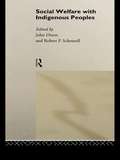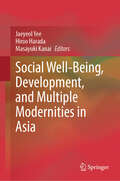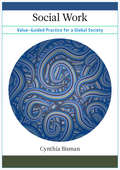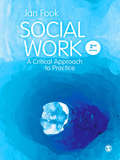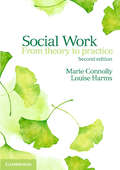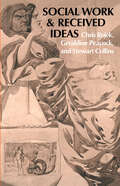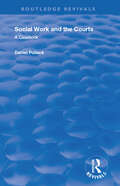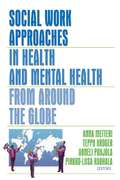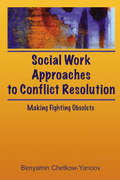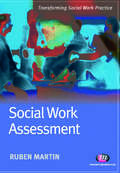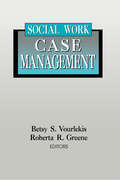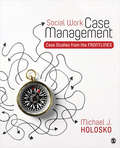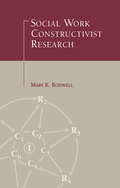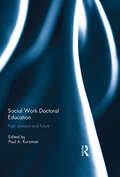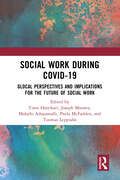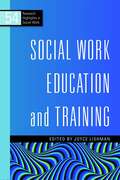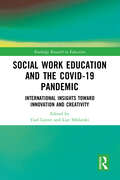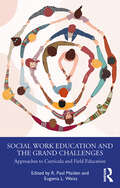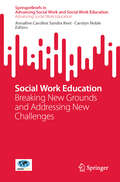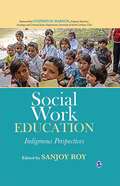- Table View
- List View
Social Welfare with Indigenous Peoples (Comparative Social Welfare Series)
by John Dixon Robert P. ScheurellIn many areas of the world, there has been an earlier indigenous population, which has been conquered by a more recent population group. In Social Welfare with Indigenous Peoples, the editors and contributors examine the treatment of many indigenous populations from five continental areas: Africa (Sierra Leone, Zimbabwe); Australasia, New Zealand; Central and South America (Brazil, Mexico); Europe (Scandinavia, Spain) and North America. They found that, regardless of whether the newer immigrants became the majority population, as in North America, or the minority population, such as in Africa, there were many similarities in how the indigenous peoples were treated and in their current situations. This treatment is examined from many perspectives: political subjugation; negligence; shifting focus of social policy; social and legal discrimination; provision of social services; and ethnic, cultural and political rejuvenation.
Social Welfare: A History of the American Response to Need
by Mark J. Stern June AxinnSeeing social work and social welfare through a historical lens This book is part of the Connecting Core Competencies Series. This series helps students understand and master CSWE’s core competencies with a variety of pedagogy highlighted competency content and critical thinking questions for the competencies throughout. Social Welfare: A History of the American Response to Need allows students to place current issues of social concern in their historical context. Numerous original documents help students understand the impact of history on current social welfare issues.The book examines the history of social work and social welfare in the United States since the 18th century. It shows how social conditions, ideas about dependency and poverty, and institutions have shaped social policy and the efforts of voluntary organizations and individuals who work with at-risk populations. Coverage of economic developments, the impact of volunteerism, and the impact of privatization in Social Welfare: A History of the American Response to Need helps students understand the context of social welfare movements and policies. By examining forces of social change and continuity, the text helps students see contemporary topics like health care reform, welfare, and homelessness through a historical framework.
Social Welfare: Scottish Perspective (Routledge Revivals)
by Mono ChakrabartiThis title was first published in 2001. This volume, adopting a Scottish perspective, concentrates on welfare issues in the UK. The book acknowledges the fact that the Scottish legislative base has, historically, been different from the rest of the country, and explores the impact of these differences upon the nature of welfare institutions and service provision. The contributors also critically investigate the important changes being implemented in Scotland within the disaggregated local authority structure, exposing the resource implications for service providers. The book tackles policy issues ranging from poverty and social security to health care, education and criminal justice. An analysis of the relevant laws is incorporated into every chapter, together with an investigation of the crucial implications of social and welfare policies for family structure, class and ethnicity.
Social Well-Being, Development, and Multiple Modernities in Asia
by Jaeyeol Yee Hiroo Harada Masayuki KanaiThis book presents an integrated international exploration of social well-being from a comparative standpoint: how it is framed, how it is perceived by the people, and how it is exploited by the state. It provides a genuine multicultural and multidimensional understanding of social well-being in an Asian context by showing the strength of comparative analysis. The idiosyncrasy of an individual society is reinterpreted through the universality of harmonized data analysis and imaginative discussion of the findings. The book offers the reader a deep understanding of how social well-being is framed in eight Asian countries, how it is contextualized in each society, and how it is correlated with the concept of development and sustainability. Articulated by carefully chosen examples, historical background, and interpretation of the latest data analysis, this book is highly recommended to readers who seek to understand the relationship among the well-being of individuals, national development, and global sustainability.
Social Work
by Cynthia BismanThis innovative textbook reconfigures generalist social work practice for the twenty-first century
Social Work
by Jan FookSocial Work: A Critical Turn is both an introduction to critical social work and an examination of current theory and practice. This volume features contributions from an international group of scholars who define the main theoretical underpinnings of a critical approach to social work and examine innovative practice methods using this approach. Social Work: A Critical Turn situates critical social work within a theoretical context, comparing it with postmodernist, radical, feminist, anti-racist and structural approaches. It also reviews key issues that require further development in critical social work theory, practice and research.
Social Work
by Jan FookSocial work is a human profession founded on social justice. It is difficult however to negotiate this in the constantly-changing context of the twenty first century. Now in its' second edition, this book considers the critical tradition of social work and updates it with postmodern thinking. Jan Fook draws on critical reflection to help social workers deliver flexible, responsible and responsive practice and to celebrate the ageless ideals of the profession. Key ideas covered in the text include: - Postmodernism - Critical theories - Critical reflection - Contextuality The author draws on her own experiences, to relate theoretical ideas to real life. Summaries, exercises and further reading are also included in each chapter. The book will be essential reading for all undergraduate students of social work. It will also be a valuable resource for postgraduate students and qualified professionals, who want to revisit the critical tradition of social work.
Social Work
by Marie Connolly Louise HarmsThis wide-ranging collection of essays offers valuable insights into the cultural issues involved in the practical application of social work theories. Leading contributors explore the challenges faced by indigenous populations and ethnic minority groups, examining how they can gain control over their position as minority populations, and offering valuable guidance on cross-cultural work. The direct implementation of four established theoretical approaches - ecological systems, community development, strengths-based approaches and attachment theories - is shown in a variety of contexts, including mental health care, trauma counselling and child protection. Using community development work in Australia and New Zealand as a case study, the contributors also advocate using these approaches in work with migrants and refugees. Social Work Theories in Action recognizes the importance of drawing on the strengths of families, individuals and communities and offers theoretical perspectives that can be applied in everyday work situations. It is essential reading for social and community workers, mental health professionals and social work students.
Social Work & Received Ideas
by Chris RojekFirst published in 1989. Routledge is an imprint of Taylor & Francis, an informa company.
Social Work & the Courts: A Casebook
by Daniel Pollack Toby G. KleinmamSocial Work and the Courts is a compendium of the most recent and important legal cases in social work and social welfare. Its dissection and analysis of crucial cases makes it an excellent tool for teaching social workers to understand the legal system and its operation. The book demonstrates how courts view and deal with the performance, action, and conduct of social workers and their agencies. This second edition includes more case studies, paying particular attention to recent cases on foster care and child welfare. In addition, a new section on "References and Further Readings" has been added to the end of each chapter along with an update bibliography and Internet bibliography so that readers may easily find supplementary information.
Social Work Approaches in Health and Mental Health from Around the Globe
by Pirkko-Liisa Rauhala Anna Metteri Teppo Kroger Anneli PohjolaOvercome the challenges facing social workers today with international guidance Social Work Approaches in Health and Mental Health from Around the Globe is a valuable stepping stone toward an understanding of the diversity of methods utilized in social work for community health services. This work stems from material gathered at the Third International Conference on Social Work in Health and Mental Health, held in Tampere, Finland. In this book, you will find new creative theoretical and practical orientations for designing, developing, and analyzing social work to help you produce policies and services in which clients can positively and productively invest.Social Work Approaches in Health and Mental Health from Around the Globe covers a long period in the history of social work in health issues, from theoretical treatises to empirical research and analyses of practices. The book provides you with research, case studies, and existing international and national literature from India, Botswana, Taiwan, Lithuania, the United Kingdom, Australia, and the United States. This resource explores the shared qualities of social work in health services throughout the world despite differences between countries in terms of culture, social system, and history. Although these experts come from different parts of the world, the book displays an emergence of similar issues and themes, including: the development of expertise for social workers in the health and mental health fields social work as an agent of change that crosses borders, operates on many levels, and across many dimensions of society community-based care-principles, perspectives, marginalized groups, and the role of the social worker dual divisions-becoming aware of and choosing a position in work practice
Social Work Approaches to Conflict Resolution: Making Fighting Obsolete
by B Harold Chetkow-YanoovSocial Work Approaches to Conflict Resolution helps readers understand the nature and causes of conflict and offers suggestions for coping with conflict effectively. It is based on two assumptions: that conflict is a basic part of the life of normal human beings, groups, organizations, communities, and nations, and that resolving conflict is part of the ongoing interventions of all social workers. A practical text for theory-practicum courses for MSW and doctoral students, it is filled with information also useful to therapists, group workers, community workers, administrators, scholars in the social sciences, practitioners in other helping professions, and trainers in the emerging field of conflict resolution itself. Deliberately linking conflict resolution and systems analysis, Social Work Approaches to Conflict Resolution tackles a number of related themes to help you see the connections between topics not normally presented together in social work literature. You’ll see how unmet needs may cause conflict to evolve and escalate and learn about the connections between strongly held feelings and the destructive relations that have developed between diverse ethnic peoples in many parts of our planet. Author Benyamin Chetkow-Yanoov draws on his own background of being a minority as well as his experience in Arab-Jewish reconciliation in Israel as he offers readers thorough explanations of: a systems model for analyzing conflict problem-solving versus resolving conflict how value clashes and victimization are some of the basic causes of conflict escalation 9 professional roles required for resolving conflicts the effectiveness of volunteers in conflict resolution teaching conflict resolution skills to various audiences trends in the evolution of voluntary conflict resolution effortsYou can apply much of what you learn in Social Work Approaches to Conflict Resolution not only to your professional life but also to your personal relationships and experiences. Also, since victimized people and groups are major contributors to the perpetuation and escalation of conflict, the book suggests 10 steps for helping victims free themselves from repeated conflict-generating behaviors.
Social Work Assessment (Transforming Social Work Practice Series)
by Ruben MartinAt a time of change and review within social care, it is relevant to explore traditional skills, knowledge and values associated with assessment in the context of changing practice. This book introduces and explores assessment in social work in a user-friendly, yet comprehensive way. The author reviews the interpersonal skills necessary for social work practice, applying them particularly to assessment and outlines fundamental knowledge and theoretical models that can inform assessment. The professional social work value base underpinning assessment and the power balance between assessor and the person being assessed are also taken into consideration.
Social Work Case Management
by Roberta R. Greene Betsy S. VourlekisThis new practice text provides a series of readings focusing on case management in a number of fields and in a variety of settings with different client populations. Each chapter examines a major component of case management practice by presenting information about an innovative program from a different location around the country. In conjunction, these readings provide a road map to social work case management.In addition to offering up-to-date practice approaches and examining the functions and skills of case management in depth, the authors provide the policy information needed for putting this traditional form of social work practice into today's service delivery context.
Social Work Case Management: Case Studies From the Frontlines
by Michael J. HoloskoWritten by a social worker for social workers! This innovative book equips readers with the knowledge and skills they need to be effective case management practitioners in a variety of health and human service organizations. A must-read for students and professionals in social work, this important work introduces a unique Task-Centered Case Management Model built around the unifying principles of the profession—person-in-environment, strengths-based work, and ecological perspective. Over twenty case studies by case managers and professionals offer innovative practice insights, illustrating the practice roles and responsibilities of today′s case managers and the realities of conducting case management in today’s growing, exciting, and challenging field.
Social Work Case Management: Case Studies From the Frontlines
by Michael J. HoloskoWritten by a social worker for social workers! This innovative book equips readers with the knowledge and skills they need to be effective case management practitioners in a variety of health and human service organizations. A must-read for students and professionals in social work, this important work introduces a unique Task-Centered Case Management Model built around the unifying principles of the profession—person-in-environment, strengths-based work, and ecological perspective. Over twenty case studies by case managers and professionals offer innovative practice insights, illustrating the practice roles and responsibilities of today′s case managers and the realities of conducting case management in today’s growing, exciting, and challenging field.
Social Work Constructivist Research (Social Psychology Reference Series)
by Mary Katherine O'ConnorFirst published in 1998. Routledge is an imprint of Taylor & Francis, an informa company.
Social Work Doctoral Education: Past, Present and Future
by Paul A. KurzmanThe rapid expansion of doctoral education in social work is changing academia, and expanding the expectations of education for professional practice. This volume focuses on the early development, gradual evolution and present status of social work doctoral education. Relevant for social work students and educators globally, it represents an authoritative statement authored by widely recognized educators who are on the cutting edge of doctoral education.Documenting the current state-of-the-art, this comprehensive book demonstrates the rapidly growing importance of doctoral-level education in the social work profession. The authors look closely at current trends, and address the emerging pedagogical issues that will likely frame the future.This book was originally published as a special issue of the Journal of Teaching in Social Work.
Social Work During COVID-19: Glocal Perspectives and Implications for the Future of Social Work
by Timo Harrikari Joseph Mooney Malathi Adusumalli Paula McFadden Tuomas LeppiahoThis book focusses on social work in the time of COVID-19. Social workers, their clients, and the organisations they represent have been affected by the pandemic in multiple ways. The pandemic and various efforts to curb the viral outbreak, such as face masks and lockdowns, have forced social workers to adapt to a ‘new normal’, launch new practices, mobilise social support and networks remotely, and above all, defend the most vulnerable populations. This requires an understanding of how social work and its clients are prepared for, capable to respond to, and further, to recover from a societal crisis and human disasters, like a coronavirus pandemic. Divided into three parts, it provides a wealth of knowledge related to social work in different local and cultural contexts during the period of the global pandemic. With experienced social work researchers across a diversity of settings, contexts, and research traditions, the book is reflective of the ‘glocal’ response of social work. Offering new perspectives on challenges social workers have faced in dealing with the pandemic, it makes critical and timely insights into the innovations and adaptations in social work responses, with a strong empirical basis. It will be of interest to all social work scholars, students, and practitioners.
Social Work Education and Training
by Joyce LishmanExcellent social work education and training is vital for ensuring best practice, and it is important to understand the key approaches and methods in order to provide the best teaching and ensure effective learning. This volume provides an overview of social work education, including the background and current context. It covers the key debates surrounding social work education, such as the evaluation of social work education, the use of IT, research-mindedness, and the effectiveness of interdisciplinary education. The book also offers guidance on effective teaching and learning approaches tailored to the needs of social work educators, covering teaching within a higher education institution, on student practice placements, and in post-qualifying settings. This will be an indispensable text for educators and trainers in the field of social work.
Social Work Education and the COVID-19 Pandemic: International Insights toward Innovation and Creativity (Routledge Research in Education)
by Yael Latzer Liat ShklarskiThis book examines how the shift to remote teaching in March 2020 due to the global pandemic created new opportunities for innovation and creativity and shaped how social work classes were taught, with many temporary changes now part of permanent, standard practice. Drawing on narratives from 20 social work leaders across 17 different countries, the chapters explore particular themes and viewpoints on lessons learned during the pandemic, including case studies to examine copying mechanisms, insights into the transition to remote teaching, and the creative lessons that were learned. By taking an international perspective, it represents a key contribution to the scholarship of social work leaders from around the world concerning how institutions transitioned to remote learning and teaching and how these lived experiences and new discoveries are contributing to and influencing current practice. As such, it will appeal to social work educators, researchers, and field educators around the world with interests in experimental curriculum and field practice.
Social Work Education and the Grand Challenges: Approaches to Curricula and Field Education
by Eugenia L. Weiss R. Paul MaidenThe Grand Challenges for Social Work (GCSW) provides an agenda for society, and for the social work profession. The 13 GCSW have been codified by the American Academy of Social Work and Social Welfare and are emerging as a significant underpinning in the education of undergraduate and graduate social work students throughout the USA. This volume serves as a guide as to how this can best be achieved in alignment with the 2022 Educational Policy and Accreditation Standards (EPAS) from the Council of Social Work Education. Divided into four parts: • Individual and Family Well-Being; • Stronger Social Fabric; • A Just Society; • The Grand Challenges in the Field. Each chapter introduces a Grand Challenge, situates it within the curricula, and provides teaching practices in one of the targeted domains as well as learning objectives, class exercises, and discussions. By showing how to facilitate class discussion, manage difficult conversations, and address diversity, equity, and inclusion as part of teaching the topic, this book will be of interest to all faculty teaching at both undergraduate and graduate levels. It should be noted that there are additional supplementary chapters beyond the 13 GCSW that provide further context for the reader.
Social Work Education in Europe: Traditions and Transformations (European Social Work Education and Practice)
by Nino Žganec Marion LagingThis contributed volume provides an in-depth overview of current social and socio-political transformations in Europe and their effects on social work and its educational structures. It elucidates these transformations and structures at the individual level of ten different countries and goes on to elaborate a European perspective in this field. Readers gain insight into the variety in social work and its educational structures in Europe and, at the same time, readers receive starting points for the exchange of ideas, collaboration and further development in the individual countries and in Europe. The introduction outlines the current developments and challenges facing social work education in Europe, contextualizing the topics to be covered in the volume. Each chapter offers an individual country profile of social work, including an analysis of typical examples of different traditions of educational models for social work that, collectively, provide insight into an overall "European model of education for social work". The countries selected represent all parts of Europe:FinlandLatviaGermanyUnited KingdomThe NetherlandsFranceItalyCroatiaRomaniaCyprusEuropean Social Work Education: Traditions and Transformations is an essential resource – an up‐to‐date and differentiated inventory of social work education in Europe from a horizontal and vertical perspective – which describes fields of work and approaches that prepare students to practice social work, examines the degree of academization of the discipline and investigates its structures and conditions. Social workers and social work educators, researchers and practitioners will find this an engaging and useful text.
Social Work Education: Breaking New Grounds and Addressing New Challenges (SpringerBriefs in Advancing Social Work and Social Work Education)
by Carolyn Noble Annaline Caroline Sandra KeetThis book addresses the critical question of whether social work as an universal discipline is able to respond to new social challenges that arise from a changing world that pose new sets of challenges for people in precarious situations and create calamitous psychological burden for populations. These require critical skills that need to be developed through social work education in an environment where local and global social work ethics are fused and interrogated in our classroom spaces. There is a need to address the disjuncture between curriculum content, language of text used for instruction and local realities. As a universal discipline, social work education must play a transformative role and create an enabling environment that produces graduates that are able to respond to life experiences in a global social order while also being purposeful about centering local knowledges. Transforming social work education for a new era does not rely on singular issues but demands engagement around a multitude of issues that, if addressed, enhances the responsiveness of the discipline in different contexts. The authors, who work and teach across various settings, countries, contexts and cultures, address the role that social work ought to play during and after global events like the COVID-19 pandemic, climate change, and war and conflict. It speaks to a social work that acknowledges our interconnectedness with nature, offering an educational framework that centers the politics of sustainable development. Social work students come from communities where they, themselves, have different levels of access to educational spaces. The book also looks at new ways of delivering education content, making social work training accessible to a broader population. Among the topics covered: Learning Social Accountability Through Social Work Field Education Online Teaching, eCourses and Innovative Programmes in Social Work Distance Education Teaching Reproductive Justice in Social Work Education Social Work Peace Studies Social Work Values and Education Social Work Education: Breaking New Grounds and Addressing New Challenges addresses a range of issues that social work education needs to craft in the future and is designed to support students and professionals for practice, in placement, and teaching and curricula practices.
Social Work Education: Indigenous Perspectives
by Sanjoy RoySocial work education as a concept refers to the integration of the core knowledge, values, and critical skills and competencies that social workers must acquire for competent practice in their fields of work. It is an emerging professional area in India and faces unique challenges such as the absence of local orientation and lack of synchronization between classroom learning and field realities. This edited book seeks to present perspectives on various areas of social work education from highly experienced educators in Indian universities as well as from outside India. Social Work Education: Indigenous Perspectives exhaustively discusses the major indigenous models, innovative practices and techniques of practice-based discourse in social work. It will help young social workers acquire deep knowledge and understanding of the different practice domains and thematic aspects of social work. This will, in turn, enable them to practice efficiently in today’s emerging social and cultural context.
